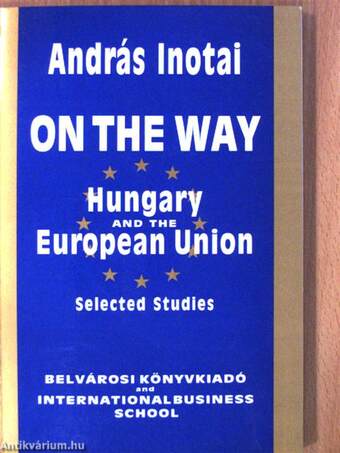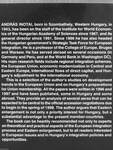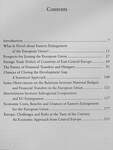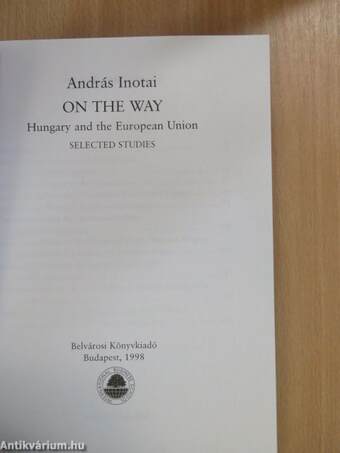1.117.562
kiadvánnyal nyújtjuk Magyarország legnagyobb antikvár könyv-kínálatát
On The Way
Hungary and the European Union/Selected Studies
| Kiadó: | Belvárosi Könyvkiadó-International Business School |
|---|---|
| Kiadás helye: | Budapest |
| Kiadás éve: | |
| Kötés típusa: | Ragasztott papírkötés |
| Oldalszám: | 230 oldal |
| Sorozatcím: | |
| Kötetszám: | |
| Nyelv: | Angol |
| Méret: | 24 cm x 17 cm |
| ISBN: | 963-9114-01-4 |
naponta értesítjük a beérkező friss
kiadványokról
naponta értesítjük a beérkező friss
kiadványokról
Fülszöveg
ANDRÁS INOTAI, born in Szombathely, Western Hungary, in
1943, has been on the staff of the Institute for World Econom-
ics of the Hungarian Academy of Sciences since 1967, and its
general director since 1991. Since 1996 he has also headed
the Hungarian government's Strategic Task Force for European
Integration. He is a professor of the College of Europe, Bruges
and Warsaw. He has served abroad on several occasions (in
Germany and Peru, and at the World Bank in Washington DC).
His main research fields include regional integration schemes,
the European Union, economic modernization in Central and
Eastern Europe, international flows of direct capital, and Hun-
gary's adjustment to the international economy.
This is a selection of the author's studies on development
trends in the European Union and on Hungary's preparations
for Union membership. All the papers were written in 1996 and
1997 and have been published, some in Hungary and some
abroad. They provide an... Tovább
Fülszöveg
ANDRÁS INOTAI, born in Szombathely, Western Hungary, in
1943, has been on the staff of the Institute for World Econom-
ics of the Hungarian Academy of Sciences since 1967, and its
general director since 1991. Since 1996 he has also headed
the Hungarian government's Strategic Task Force for European
Integration. He is a professor of the College of Europe, Bruges
and Warsaw. He has served abroad on several occasions (in
Germany and Peru, and at the World Bank in Washington DC).
His main research fields include regional integration schemes,
the European Union, economic modernization in Central and
Eastern Europe, international flows of direct capital, and Hun-
gary's adjustment to the international economy.
This is a selection of the author's studies on development
trends in the European Union and on Hungary's preparations
for Union membership. All the papers were written in 1996 and
1997 and have been published, some in Hungary and some
abroad. They provide an analysis of several aeras that can be
expected to be central to the official accession negotiations due
to begin in the spring of 1998. The author argues that Eastern
enlargement is not only a priority interest for Hungary, but a
substantial advantage to the present member-countries.
The book can be heartily recommended not only to experts
on theoretical and practical aspects of the European integration
process and Eastern enlargement, but to all readers interested
in European issues and in Hungary's integration policies and
opportunities. Vissza
Témakörök
- Közgazdaságtan > Gazdaságpolitika
- Idegennyelv > Idegennyelvű könyvek > Angol > Közgazdaságtan > Gazdaságpolitika
- Idegennyelv > Idegennyelvű könyvek > Angol > Történelem > Európa története > Magyarország története
- Idegennyelv > Idegennyelvű könyvek > Angol > Történelem > Európa története > Egyéb
- Közgazdaságtan > Magyarországon > Tanulmányok, esszék
- Közgazdaságtan > Közgazdasági elméletek > Európai Unió
- Idegennyelv > Idegennyelvű könyvek > Angol > Közgazdaságtan > Közgazdasági elméletek > Európai Unió
- Idegennyelv > Idegennyelvű könyvek > Angol > Közgazdaságtan > Magyarországon > Tanulmányok, esszék
- Történelem > Idegennyelvű > Angol
- Történelem > Kontinensek szerint > Európa, európai országok története > Egyéb
- Történelem > Politika > Külpolitika > Diplomácia
- Történelem > Magyarország története és személyiségei > Átfogó művek, tanulmányok
- Történelem > Magyarország története és személyiségei > Magyarország a XX. században > A II. világháború utáni Magyarország > A rendszerváltás utáni Magyarország > Európai Uniós tagság








